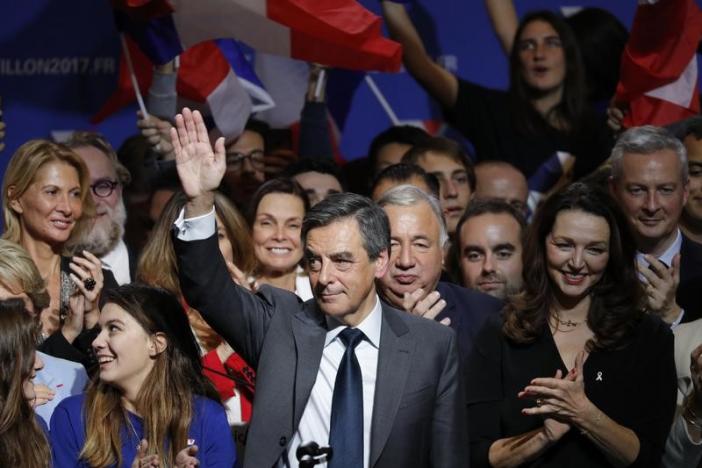France votes for center-right candidate - and perhaps next president
PARIS: Former prime ministers Francois Fillon and Alain Juppe go head-to-head on Sunday in a runoff vote for France's center-right presidential nomination, with the winner likely to face a showdown against a resurgent far-right in next year's election.
Opinion polls show Fillon, a social conservative with a deep attachment to his Catholic roots, going into the race as the clear favorite after stunning his centrist challenger with a massive surge in support just before the Nov. 20 first round.
A 62-year-old racing car enthusiast who lives in a Loire valley chateau, Fillon promises radical reforms to France's regulation-encumbered economy, vowing to roll back the state and slash government's bloated costs.
Scrambling to regain momentum, Juppe, 71, a soft-mannered moderate who is currently mayor of Bordeaux, has attacked the "brutality" of his rival's reform program and says the Paris lawmaker lacks credibility.
But in a blow to his comeback bid, television viewers found Fillon more convincing in a head-to-head debate on Thursday.
"My enemy is the decline of France," Fillon declared on Friday night, speaking to supporters in Paris at a final rally before the vote.
Many French citizens view Sunday's Les Republicains primary contest as a proxy for next spring's presidential election.
Pollsters say the winner will be favorite to enter the Elysee palace, with the ruling Socialists in turmoil and the anti-establishment National Front historically disadvantaged by France's two-round system.
Yet after Britain's vote to leave the European Union and Donald Trump's shock triumph in the U.S. election, France's vote is shaping up to be another battle of strength between weakened mainstream parties and the rising force of insurgent populists.
There could still be upsets ahead.
Voting opens at more than 10,000 polling stations across France at 8 a.m. (2.00 a.m. ET/0700 GMT) and closes at 7 p.m. The first results may emerge within an hour and a half of polls closing.
With France still under a state of emergency since Islamist militants killed 130 people in gun and bomb attacks in Paris in November 2015, and with soldiers on patrol in the capital's streets, security will be tight near polling points.
THATCHERITE PLATFORM
Juppe, who has focused his attacks on Fillon's proposals to cut public sector jobs and end the 35-hour week, bills himself as the best-placed Les Republicains candidate to defeat the far-right leader Marine Le Pen next spring.
"There is a France that is winning and a France that is suffering," he said in Thursday's debate. "We must bring the two together."
Polls show both candidates would beat Le Pen in the expected presidential runoff vote, though Juppe, who would be better placed to rally left-wing voters, would do so by a more comfortable margin.
President Francois Hollande, whose low popularity ratings mirror the disarray in the ranks of the Left, has two weeks in which to decide whether to run for re-election.
Fillon's Thatcherite economic platform would give the 62-year-old Hollande a target to attack and could convince him to make a bid for a second five-year mandate against the odds.
Current opinion polls show any Socialist candidate would get knocked out of the election's first round next April, with the Les Republicains candidate going on to beat the National Front's Le Pen in the May runoff.
In a sign of growing frustration among the Left's forces, a leading Socialist on Saturday urged both Hollande and his prime minister, Manuel Valls, to contest the party's primary in January.
Claude Bartolone, who heads the lower house of parliament, said the Socialist party would benefit if the two men and others such as former economy minister Emmanuel Macron were to stand. The latter is standing anyway as an independent.
FREE MARKETEER
Voters say they are fed up with France's near double-digit rate of unemployment -- nearly double that of some European peers -- and sluggish job creation in an economy that is forecast to grow an anemic 1.4 percent in 2016.
A free marketeer, Fillon promises to take on the powerful trade unions and push through reforms that would reduce the state's dirigiste role in the euro zone's number two economy.
He wants to axe half a million civil service jobs, a cull that will be made possible by extending the 35-hour working week to 39 hours in the public sector. Corporate tax cuts will help spur growth, and only then will income tax cuts follow he says.
In another sign of his determination to reduce state involvement in the economy, Fillon wants to roll back state support in health care.
"Reform shouldn't punish, it should provide hope," Juppe told the eight million viewers of Thursday's televised debate.
"I want to persuade the French that my reforms will not be penitence but represent a hope for improving the life of each person," he said later on Friday at a rally in Nancy.
Like Fillon, Juppe proposes scrapping France's wealth tax and increasing value-added tax (VAT). Juppe, however, would do so by one percentage point, half the increase planned by his rival. The mayor of Bordeaux also says France must cut public sector jobs, but only by 250,000.






